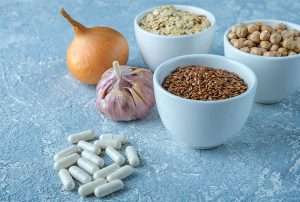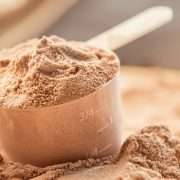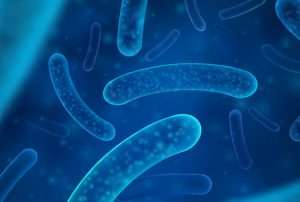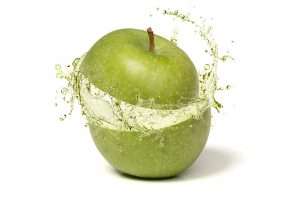10 best prebiotic foods for a healthy gut diet
Prebiotic Supplements And Foods
It seems like there are fresh, different health and wellness practices to try every week. You should choose some above the others. Start from your instincts while following one of the most popular contemporary trends. First, let me answer your typical, ‘what is prebiotic’ question. Prebiotics are categorized as non-digestible food materials that have a positive impact on the host by deliberately promoting the growth and activities of one or a small number of species of bacteria that are currently present in the colon.
Numerous bacteria and fungi which live in your gut aid in the digestion and absorption of nutrients from the food you consume. Additionally, these fungi and bacteria are in charge of creating vitamins, lowering bodily inflammation, warding off harmful germs, and alerting the immunological system to make extra white blood cells. They also safeguard the stability of the gut wall. Together, these inhabitant microbes make up the gut microbiome, a complex ecology that can be upset and out of balance by factors including certain antibiotics, a persistently bad diet, stress, and drugs.
Even though some habits may harm the gut microbiota, they can also be enhanced and encouraged to thrive with helpful practices and foodstuffs. Prebiotics are perhaps equally significant as probiotics, despite having received much focus and praise for serving as the gut’s go-to remedy. Prebiotics are nutritional fibers (carbohydrates) that are difficult to digest for humans but serve as the preferred energy source and nutrition for our friendly bacteria in the gut. These fibers include lactulose, glycan, inulin, and oligosaccharides.
Prebiotics actually only nourish the good bacteria found in the gut, not any pathogens that could be detrimental. Amidst all these food products being rich, natural sources of probiotic and prebiotic foods, various individuals are actively scavenging the internet for different probiotic and prebiotic supplements
Best Probiotic And Prebiotic Foods
1. Apples
Apples are known as well-liked fruits because of their adaptability, crispy texture, and sour and sweet taste. Given that apples are a fantastic source of prebiotic pectin, it’s possible that the proverb “An apple a day keeps the doctor away” is true when it came to gut health as well. In fact, pectin, a prebiotic fiber that supports the intestinal bacteria that produce butyrate, makes up roughly half of the fiber in apples. Short-chain fatty acids called butyrate and butyric acid are created by beneficial bacteria as they decompose carbohydrates. It lessens inflammation, aids in maintaining the gut wall, and nourishes the colon’s lining cells.
2. Seaweeds
In addition to being a fantastic supply of iodine, which can be difficult to include in the diet, seaweed also serves as a fantastic supply of prebiotics. Seaweed contains between 40 and 70 percent water-soluble fiber, which may prevent the development of illness-causing bacteria whilst fostering the growth of beneficial bacteria.
3. Garlic
Garlic is a simple and calorie-free method to add flavor to your food as each piece only has four calories. Studies have discovered that garlic can help lower the incidence of atherosclerosis and cardiovascular disease. Garlic is an allium, like onion and leek, which provides immunity protection, is anti-cancerous, and contains certain anti-inflammatory benefits. Inulin prebiotics and fructooligosaccharides, which nourish your good bacteria, are also abundant. Additionally, it has been demonstrated that garlic’s antibacterial qualities prevent the development of harmful Clostridium bacteria in the gastrointestinal tract. Take advantage of minced garlic in your nourishing soups, flatbreads, and stir-fried food.
4. Barley And Oats
It has been demonstrated that eating whole grains increases the number of Lactobacillus types and other beneficial gut bacteria. The largest concentrations of beta-glucan, a prebiotic fiber that has been proven to lower cholesterol and triglyceride concentrations and feed the gut microbes, are seen in oats and barley. Both of them, whole oats and barley can indeed be cooked overnight in a dish or made into oatmeal for a substantial breakfast similar to muesli.
5. Asparagus
Inulin content in 100 grams of asparagus, or a portion with 20 calories, ranges from 2 and 3 grams. This makes it one of the fewest calorie-dense sources of inulin, a prebiotic fiber is known to promote healthy glucose and insulin levels, support the growth of Bifidobacterium and Lactobacillus types and other beneficial bacteria in your gut, and improve digestive function. Try adding thin slices to fresh, green salads, shaving on sandwiches, or topping avocado toast to get the most out of the inulin, which is more efficient when asparagus is just raw.
6. Bananas
Despite the fact that you must bite into an unripe, very green banana to properly enjoy the benefits, bananas are yet another important source of prebiotic inulin. The majority of the prebiotics are completely disintegrated by the time when the banana has gotten soft and ripe, turning a cheerful yellow color. Unripe bananas can be eaten in more appetizing ways, such as by slicing them thinly and mixing them with leftover overnight oats, cinnamon, or yummy cottage cheese.
7. Chili
Prebiotics can be found in abundance in kidney beans that are frequently used in chili. Use chicken rather than beef if your wish is to avoid consuming red meat. Or, to turn it vegetarian or vegan-friendly, omit the meat-based products entirely and simply add more beans.
8. Chocolate or Cocoa Powder
Most males are easily persuaded to include a small amount of chocolate in their diets, and as much as you keep choosing dark chocolate and cocoa powder, you’re providing your gut beneficial prebiotics. The darker your chocolate, the better; if you can obtain the real cocoa powder, the prebiotic effectiveness will be maximized. Dark chocolate variants that contain at least 70% cocoa are recommended for maximizing the nutritional benefits of cocoa. You may soak the cocoa powder to make a hot beverage or use it in shakes, smoothies, and your daily breakfast bowls. Additionally, cocoa includes flavanols like catechin, which reduce inflammation and might even help lower the risk of stroke, cardiac arrest, and cardiovascular events.
9. Chicory Root
Although chicory root is famous all over the world, it hasn’t yet made it into most people’s standard diets. However, it’s a staple that you should pick up on your next trip to the store if you’re trying to boost the health of your digestive tract. Among the main sources of inulin fiber is chicory root, which is why many well-liked fiber-enriched bowls of cereal, munchies, bread, granola bars, and various other packaged healthy foods feature it among their contents. Chicory can also be used as an alternative to decaffeinated coffee. You can make a prebiotic-rich beverage with a coffee-like flavor by soaking the root in boiling hot water.
10. Chickpeas
Another variety of legumes with high prebiotic fiber is chickpeas. It is largely advised to find new and interesting ways to include them in several snacks or meals during the day.
11. Flaxseeds
Flaxseeds are praised for their outstanding nutritional profile, especially their high concentration of omega-3 fatty acids. They are actually among the finest source of vegan foods providing anti-inflammatory, heart-healthy, and nutritional benefits. They are a superpower for your digestive system as well because they are loaded with fiber, particularly prebiotic inulin. To increase your consumption of fiber, fat, proteins, minerals, and vitamins, sprinkle them on salads, cereal, milkshakes, or homemade protein bowls
FAQs
1. What benefits does prebiotics have for digestion?
Prebiotics offers the good bacteria in your gut what they need to thrive. Your body can’t process these carbohydrates. They travel to the lower gastrointestinal tract where they act as food to encourage the growth of good bacteria. Dwell probiotics are beneficial bacteria and yeasts that are alive in your body and support a healthy digestive function.
2. Does Happy Tummy increase my energy levels?
Your body can better utilize and absorb nutrients with the aid of probiotics. More energy and a general feeling of well-being follow once your body is receiving the proper amount of minerals and vitamins.
3. What time of day is ideal for taking Happy Tummy?
Prebiotics can be taken either before bed or even when you wake up, generally speaking. Alternatively, you can do it whenever suits you best. The most crucial step is to have them every day.
4. Are prebiotics helpful for bloating issues?
According to this study, prebiotics may greatly assist in regulating the breakdown of intestinal gas. This could significantly aid in many individuals’ efforts to reduce bloating or excessive gas.
5. Does taking probiotics for cramps work?
The indications of irritable bowel syndrome or IBS such as diarrhea, gas, stomach cramping, and stomach pain may all be alleviated by probiotics.















